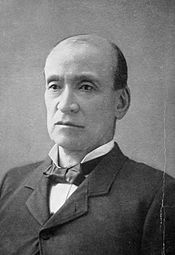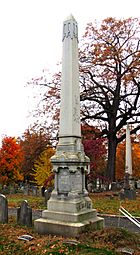Oliver Perry Temple facts for kids
Quick facts for kids
Oliver Perry Temple
|
|
|---|---|
 |
|
| Born |
Oliver Perry Temple
January 27, 1820 Greene County, Tennessee, United States
|
| Died | November 2, 1907 (aged 87) Knoxville, Tennessee, United States
|
| Resting place | Old Gray Cemetery Knoxville, Tennessee |
| Alma mater | Washington College |
| Occupation | Attorney |
|
Notable work
|
The Covenanter, the Cavalier, and the Puritan (1897) East Tennessee and the Civil War (1899) Notable Men of Tennessee (1912) |
| Political party | Whig Constitutional Union Republican |
| Spouse(s) | Scotia Caledonia Hume |
| Children | Mary Boyce Temple |
| Parent(s) | James and Mary Craig Temple |
Oliver Perry Temple (born January 27, 1820 – died November 2, 1907) was an important American lawyer, writer, and judge. He worked mostly in East Tennessee during the second half of the 1800s. Before the Civil War, Temple helped organize people in East Tennessee who supported the Union.
In June 1861, he wrote the final plans for the pro-Union East Tennessee Convention. During the first part of the war, he often defended Union supporters in court. These people had been accused of disloyalty by Confederate leaders. After the war, Temple worked to help East Tennessee grow. He supported farming and new businesses. He also helped create the Rugby Colony. In his later years, he wrote several books about the history of East Tennessee.
Contents
Early Life and Education
Oliver Perry Temple was born near Greeneville, Tennessee. His parents were James and Mary Temple. He grew up on his father's large farm. As a teenager, he loved debating. He would walk many miles to join debate groups at country schools. When he was 16, he started at Greeneville College. But in 1838, he left to join the state militia. He helped with a situation involving the Cherokee people.
While serving in the militia, Temple read a book by the philosopher John Locke. This inspired him to study law. He went to Tusculum College from 1838 to 1841. Then he attended Washington College from 1841 to 1844. There, he was a classmate and helper to Zebulon Baird Vance, who later became a governor of North Carolina. After college, Temple studied law with Judge Robert McKinney. He became a lawyer in 1846. He first worked in Greeneville with Freeman Compton. Compton later became a judge in Arkansas.
A Young Politician
In 1847, Temple ran for Congress in Tennessee's 1st district. He ran against the current representative, Andrew Johnson, who was a Democrat. Temple criticized Johnson for some of his votes and actions. Two days before the election, Temple and Johnson had a big debate in Jonesborough. They both accused each other of avoiding service in the Mexican–American War. Temple later wrote that Johnson called him a "Juvenile Competitor" and threatened him. On election day, Johnson won by a small number of votes.
In 1848, Temple moved to Knoxville, Tennessee. There, he started a law firm with William Henry Sneed. In 1850, President Millard Fillmore asked Temple to help make peace with Native American tribes. These tribes were in areas that the U.S. had gained during the Mexican-American War. When he returned to Knoxville, Temple helped start the Knoxville and Ohio Railroad. He also briefly worked as a director for the East Tennessee and Georgia Railroad. In 1855, after Sneed was elected to Congress, Temple started a new law firm with Connally Findlay Trigg, who later became a federal judge.
In 1856, Temple attended a business meeting in Knoxville. He spoke against a plan to restart the African slave trade. In 1860, he went to the Constitutional Union Party meeting in Baltimore. He supported their candidate, John Bell, for president.
Standing Up for the Union
When people in Knoxville started talking about leaving the Union in late 1860, Temple took action. He organized a meeting for Union supporters at his house. They decided to speak out against those who wanted to leave the Union. They planned to do this at a city meeting on November 26 at the Knox County Courthouse. Temple gave two speeches at this meeting and another one on December 8. These meetings were very important for Union supporters in the area. Because of these efforts, other counties in East Tennessee also held meetings and declared their loyalty to the Union.
Temple and other Union supporters traveled around East Tennessee in early 1861. In a speech near Concord, Temple spoke to a crowd that was against him. He said that while the Constitution protected slavery, he would rather slavery "perish" if it meant saving the Union. Temple's office on Gay Street was a popular meeting spot for Unionists. He once helped calm a tense situation there between John Bell, who had switched to supporting the Confederacy, and William G. Brownlow, a strong Unionist newspaper editor.
In June 1861, the East Tennessee Convention met in Greeneville. Temple wrote a set of resolutions for the delegates to approve. These resolutions asked the state government to let the counties of East Tennessee leave Tennessee and form their own state that would stay with the Union. The state government said no to this idea. Soon after, Confederate soldiers came into East Tennessee by train and took control of Knoxville.
Temple left for the North in August 1861. This was after Brownlow warned him that Confederate leaders planned to arrest Union supporters in Knoxville. But Temple returned a few weeks later. He promised Confederate leaders he would stay neutral during the war. He spent much of the first part of the war defending Unionists in court. These included people involved in the East Tennessee bridge burnings and some who took part in the Great Locomotive Chase.
When the Union Army arrived in Knoxville in September 1863, Temple was very happy. He ran down Gay Street behind the soldiers. Soon after, General Ulysses S. Grant met with Temple. Grant asked if it was possible to march up the French Broad River into North Carolina and then to Virginia. He hoped to surprise Robert E. Lee's army. Temple advised against it. He warned that the Blue Ridge Mountains made such a trip almost impossible.
After the War: Helping East Tennessee Grow
After the war, Temple quickly started a new law firm. In 1866, he became a judge (called a "chancellor") for Tennessee's Eighth Chancery District. In 1870, he moved to the Second Chancery District and served there until 1878. Temple earned a lot of money as a lawyer. However, he lost much of his wealth during a financial crisis in 1873.
Throughout the 1870s, Temple worked hard to help East Tennessee's economy grow. He was a leader in the Knoxville Industrial Association and president of the East Tennessee Farmers' Convention. He believed in having a mix of farming and industry. He gave many talks about East Tennessee's good climate and natural resources.
In the late 1870s and early 1880s, Temple helped the Rugby Colony. This colony was being built on the Cumberland Plateau. He gave legal, farming, and promotional help. On September 16, 1880, Temple hosted a big dinner in Knoxville for the colony's founder, Thomas Hughes. He also spoke at the colony's "opening" a few days later.
Temple stopped working as a lawyer in 1880. With help from Congressman Leonidas C. Houk, he became the postmaster for Knox County the next year. In 1893, he wrote a short history of Tennessee governor John Sevier. This was for the reburial of Sevier at the Knox County Courthouse. In 1897, he published a book called The Covenanter, The Cavalier, and The Puritan. This book talked about the history and contributions of the Scotch-Irish people in America.
Writing History
In 1899, Temple published his book about the Civil War, East Tennessee and the Civil War. He wrote this book to explain and defend the actions of East Tennessee's Union supporters. Many people in the South saw these Unionists as traitors. Temple believed that East Tennessee's Union feelings came from the American Revolution. He also thought it was because of the early Scotch-Irish settlers, who loved freedom and independence.
Temple believed that leaving the Union was against the Constitution. He argued that the country's founders wanted a lasting Union. He said that a revolt was only right if the government was unfair. He tried to show that the U.S. government had often been fair to Southern interests. Temple thought that the idea of leaving the Union was not mainly about slavery or states' rights. Instead, he believed it was driven by Southern leaders who wanted more power. He even suggested that most Southerners did not want to leave the Union in 1860. He thought votes for leaving were sometimes due to threats or panic.
Temple's book shares detailed stories about important events in East Tennessee during the Civil War. Many of these events he saw himself. He gives one of the best descriptions of the East Tennessee bridge burnings. He worked hard to find and talk to people involved in this event. He also gives a very valuable account of the East Tennessee Convention. He was a key part of this convention and wrote its final plans.
His Legacy
Temple became very sick in 1904 and never fully recovered. He died on November 2, 1907. He was buried in Knoxville's Old Gray Cemetery. A tall stone monument marks the Temple family burial spot.
Temple married Scotia Caledonia Hume in 1851. Their only child was Mary Boyce Temple (1856–1929). She put together and published Notable Men of Tennessee. This book was a collection of biographies her father had written about people from the Civil War era. Mary Boyce Temple also helped start the Ossoli Circle in Knoxville. She worked to get women the right to vote in the early 1900s. Oliver Perry Temple was of Scottish and English background. His large home, Melrose, was named after Melrose, Scotland. This was where his wife's parents were from.
Temple was a trustee for the University of Tennessee for over 50 years, from 1854 until his death. He helped create the school's College of Agriculture. He was also an important advisor to the university president, Charles William Dabney. Today, Hess Hall on the university campus stands where his Melrose mansion used to be.
See also
- James C. Luttrell
- Samuel Cole Williams
 | William M. Jackson |
 | Juan E. Gilbert |
 | Neil deGrasse Tyson |



